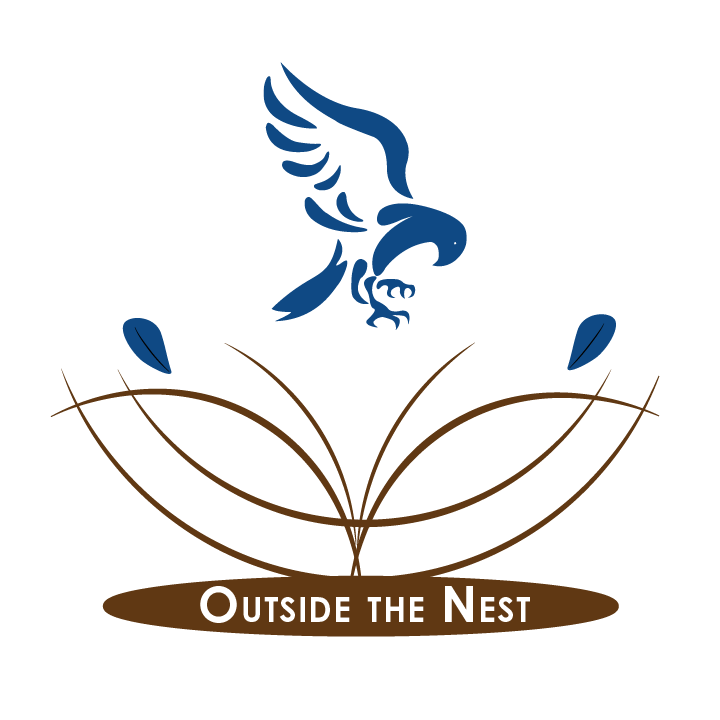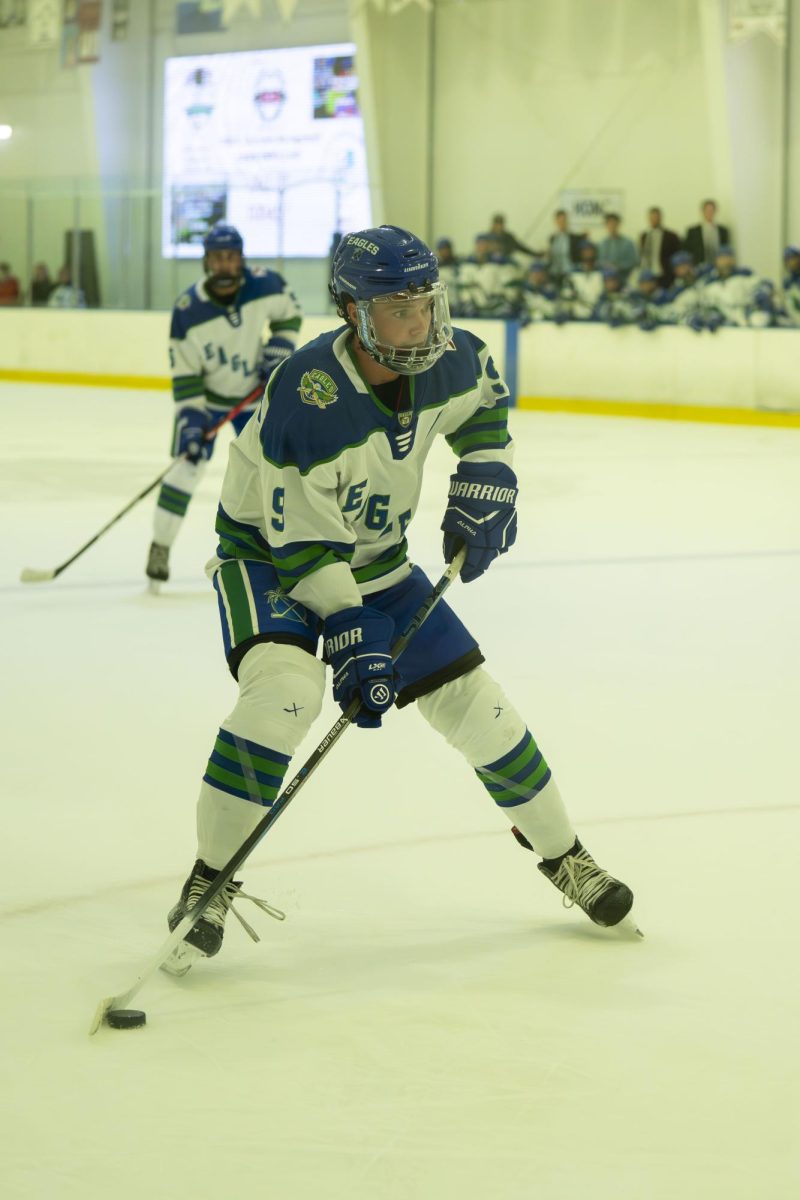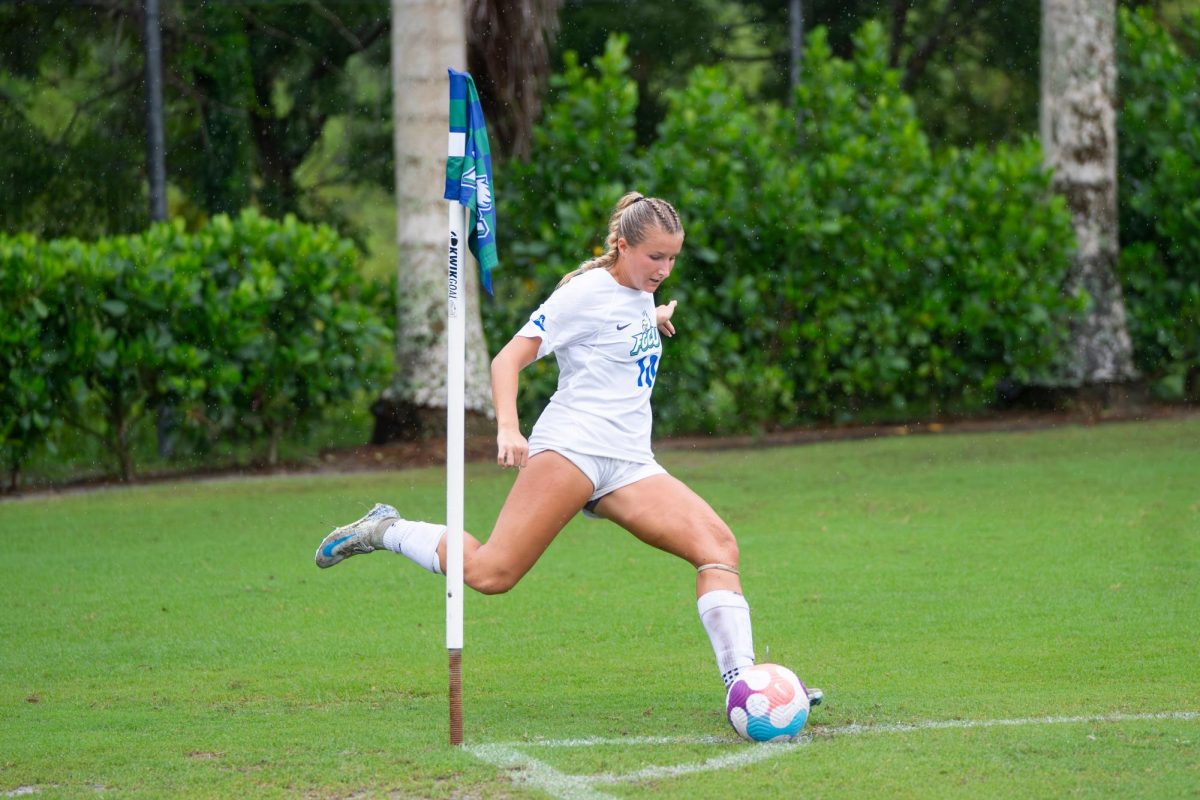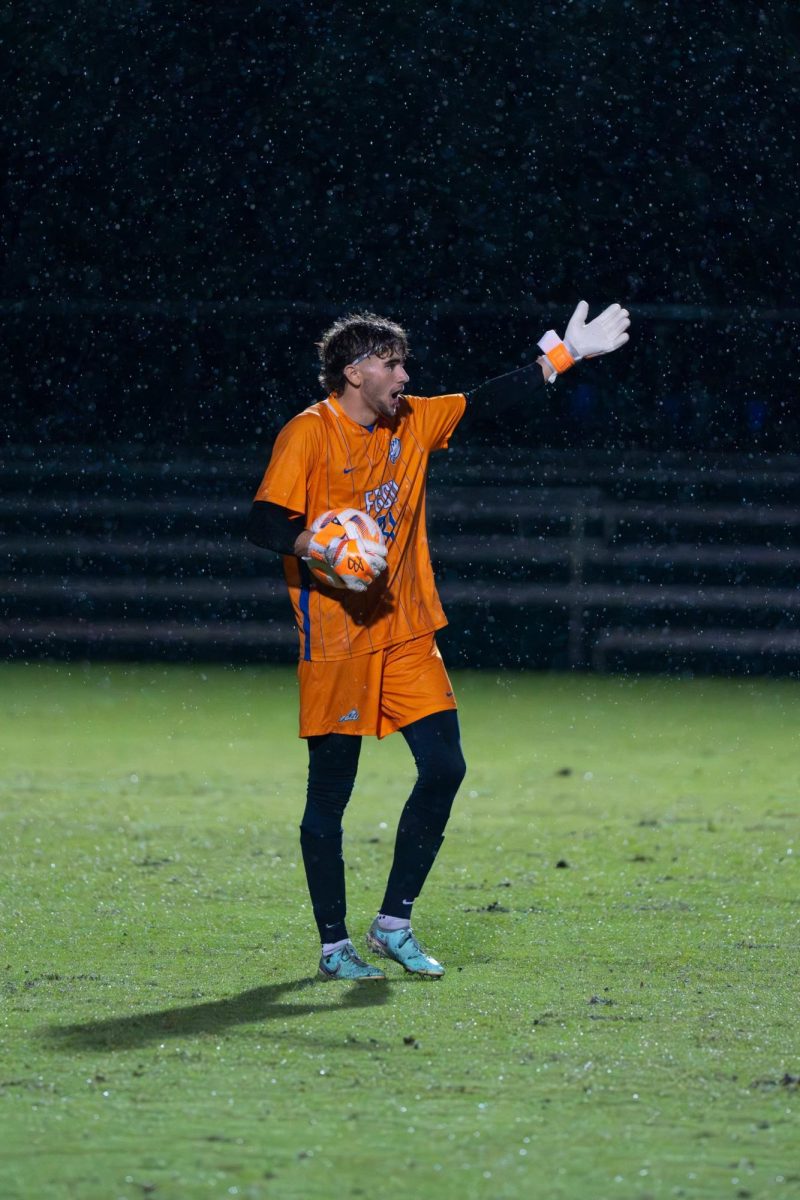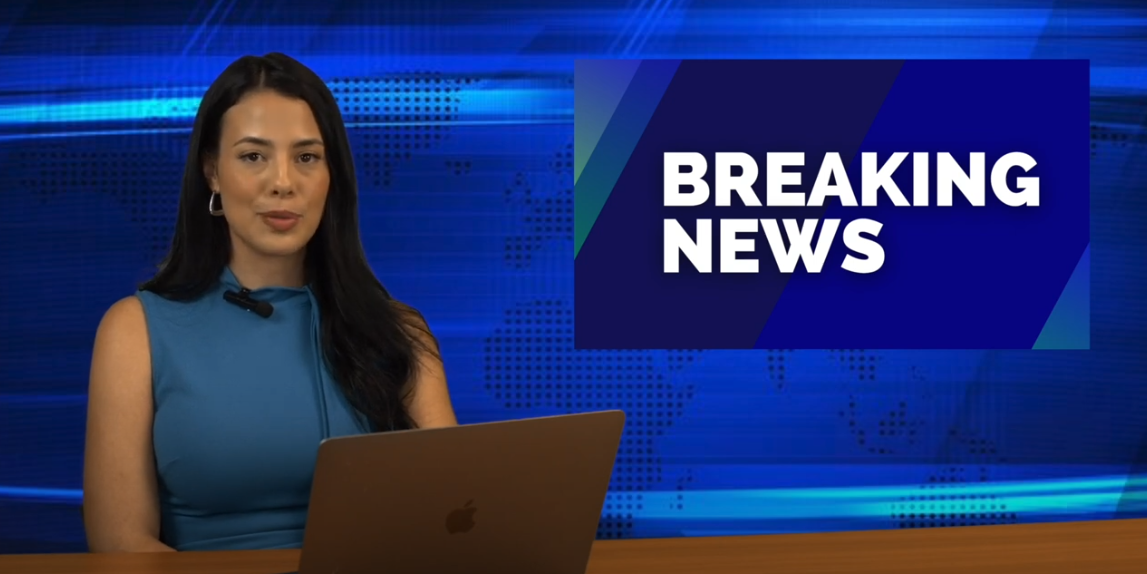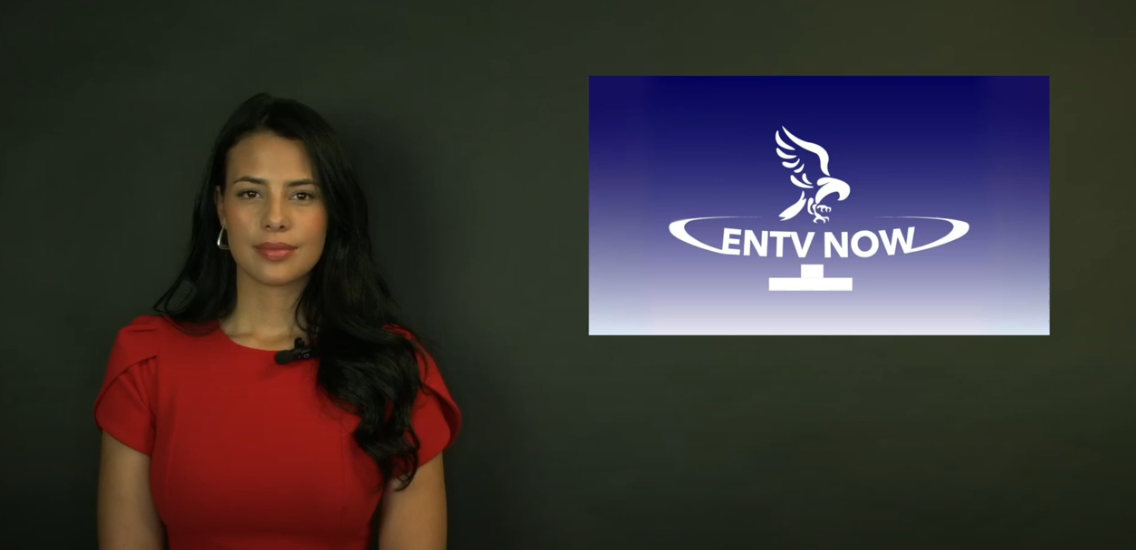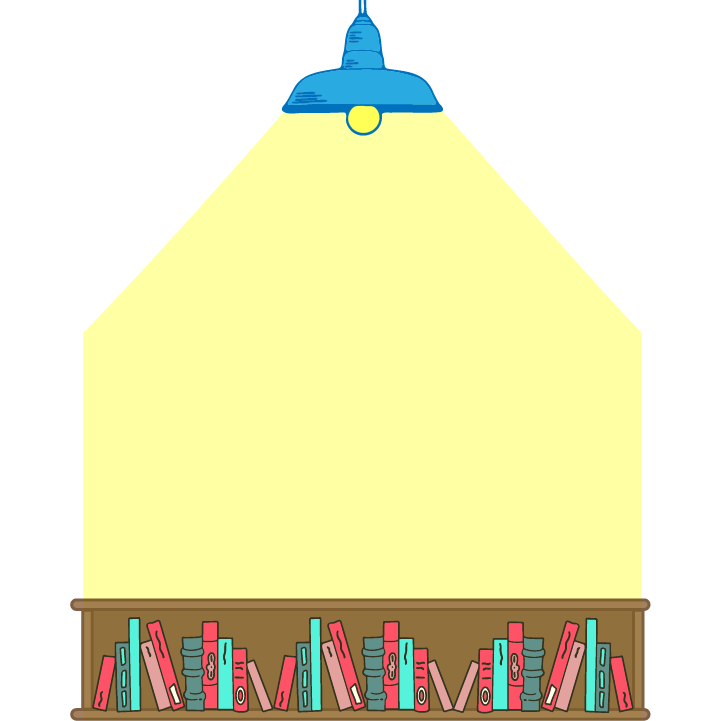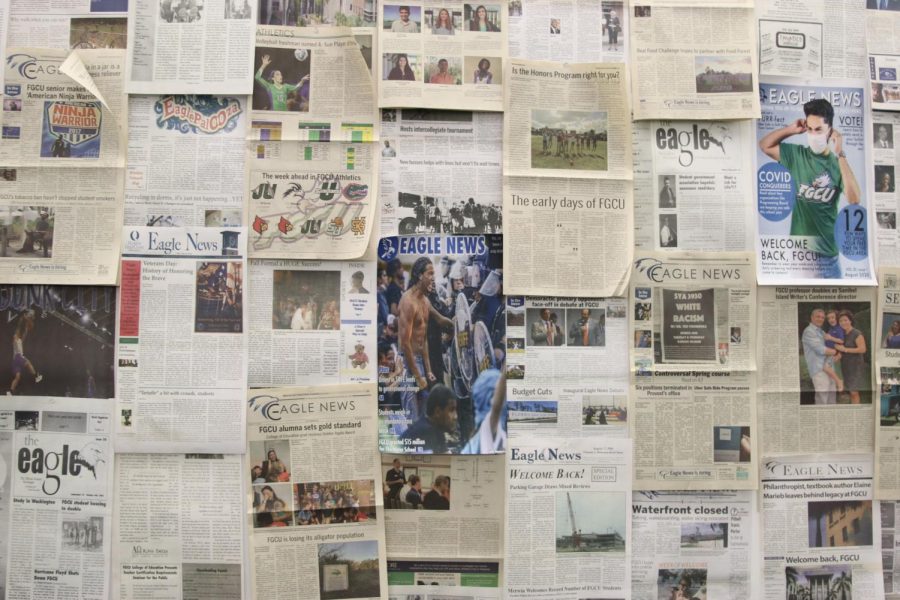Eagle News Reflects on its 25 Years of Operation
Years of Eagle News issues cover a wall in the University Archives exhibit “Wings Up: 25 Years of Student Life at FGCU.”
November 18, 2022
Twenty five years ago, FGCU was a newborn institution, and its first class was roaming the university’s buildings. One of the first milestones working towards putting FGCU on the map was the faculty-led founding of a school paper, Eagle News.
Initially named The Eagle, it would begin reporting alongside FGCU’s first classes in the fall of 1997.
“Faculty wanted everyone to feel like FGCU was a ‘real’ university,” Dr. David Cox, the editor-in-chief from 1997 to 1998, said. “They thought it was the thing to do, to have some place where writers can share campus information that students might not otherwise know about, and keep them informed about this kind of new experimental college they attended, as it was at that time.”
In the early days, content was printed every Friday with help from a Cape Coral-based publication. Now, there’s a monthly magazine that comes out as well as weekly website content.
Most of the content was FGCU-centric news, and was supplemented by columns centered around other topics. Dr. Cox added that a large percentage of stories related to Student Government and university developments.
Journalism wasn’t a program at the university yet, and operations began in a trailer.
“If you look at the coverage, there was a lot of material that was focused on campus issues and what was happening in Student Government,” former Faculty Advisor Glenn Whitehouse said. “I think it was a project that reflected the interests of the campus and the interests of the people who were writing the paper.”
The Eagle would rebrand to Eagle News in 2003. The publication briefly ran as The Eaglet in the 2000’s and even had a rival paper, The Swamp Times, emerge in 1998 due to rumored disagreements between editors of The Eagle.
The desire to legitimize FGCU by keeping students informed about campus-specific topics remained with Eagle News into the mid-2000s. While the foundation of the university was there, a period of rapid growth would pave the way for the what was to come.
“During my tenure, FGCU went from about 6,000 to 10,000 students pretty quickly,” C.J. Pisiezcko, the editor-in-chief from 2005 to 2006, said. “We wrote about a school that went from being a satellite campus not even eight years prior to becoming its own university. Sororities and fraternities formalizing themselves, new buildings. Student life in general was a great thing to capture.”
Pisiezcko expressed that Eagle pride was a huge motivating factor for his writers. They wanted to be a part of the growing institution’s history, and during a period of great change, they saw the potential for what FGCU could become.
At the start of the decade in 2010, there was a redesign to the weekly print edition. The new formatting resembled a newspaper as opposed to a tabloid magazine. Design elements, like font, color and spacing were all updated to fit the modern standard.
Eagle News was also making itself known on the national stage. Staff and editors attended various university media conventions in the early 2010’s, including events hosted by the College Media Association and the Associated College Press.
“It was the best thing. People were there for all the college papers across the country,” Allison Gagliardi, the editor-in-chief from 2010 to 2012, said. “We won second place in Design Spread of the Year and received two honorable mentions at the ACP Awards in 2011. It was the first award EN had ever won. We lost Design Spread of the Year to The Harvard Crimson, so we basically won, right?”
Gagliardi, known in Eagle News’ lineage for her organization skills and lengthier two-year tenure, also ushered in digital content for the publication. These would come in the form of updates posted to the Eagle News website and Facebook page. Although the current web address, eaglenews.org, hosted its first content in 2013.
Many issues covered by Eagle News teams of the past are still covered today. Topics relating to Student Government, parking, institutional diversity and the campus preachers remain evergreen.
Occasionally, special editions of the paper would be published, including a National Coming Out Day issue, one commemorating FGCU Men’s Basketball winning an ESPY, new student guides and university election overviews.
April Fools’ Day editions took on different titles, and contained satirical content related to the university, usually confined to the first page. For 2017’s April Fools’ Day, Eagle News took on the moniker of “Seagull News,” named for the year’s sports editor. During another year, it was named “The Golf Course Times” as opposed to “The Gulf Coast Times”.
There were times when difficult decisions had to be made by staffers, especially when covering controversial topics on campus. FGCU’s Student Media Advisory Board, which consists of local media professionals, offers guidance to Eagle News during difficult situations.
In 2015, a group of students within Eagle News founded Eagle News TV to provide news, entertainment and sports coverage. After hiring a full-time staff advisor, Eagle Radio was established. Several years later, Eagle News, ENTV and Eagle Radio were recognized as a joint outlet, Eagle Media.
Emily Ford, the editor-in-chief from 2016 to 2017, shares the publication’s coverage of a mold outbreak at The Reef as a time when both parties worked together to carry out the ethos of journalism.
“I remember going to our advisory board, and they complimented us first, because we were the first people to break that story in the area,” Ford said. “But they were also saying, ‘Now, you have this big story,’ and they let us know of ways to get information to continue coverage because these students are going to keep dealing with this for months.”
Eagle News editors and writers kept their heads up through the pandemic. While all operations were carried out virtually, content was still flowing. Certain writers had times during the week that they were “on call” to cover breaking news, much of which related to the university’s handling of COVID-19.
Through the changing of presidents, hurricanes, strides towards NCAA championships and vital moments in campus history, Eagle News has remained, and will forever.



